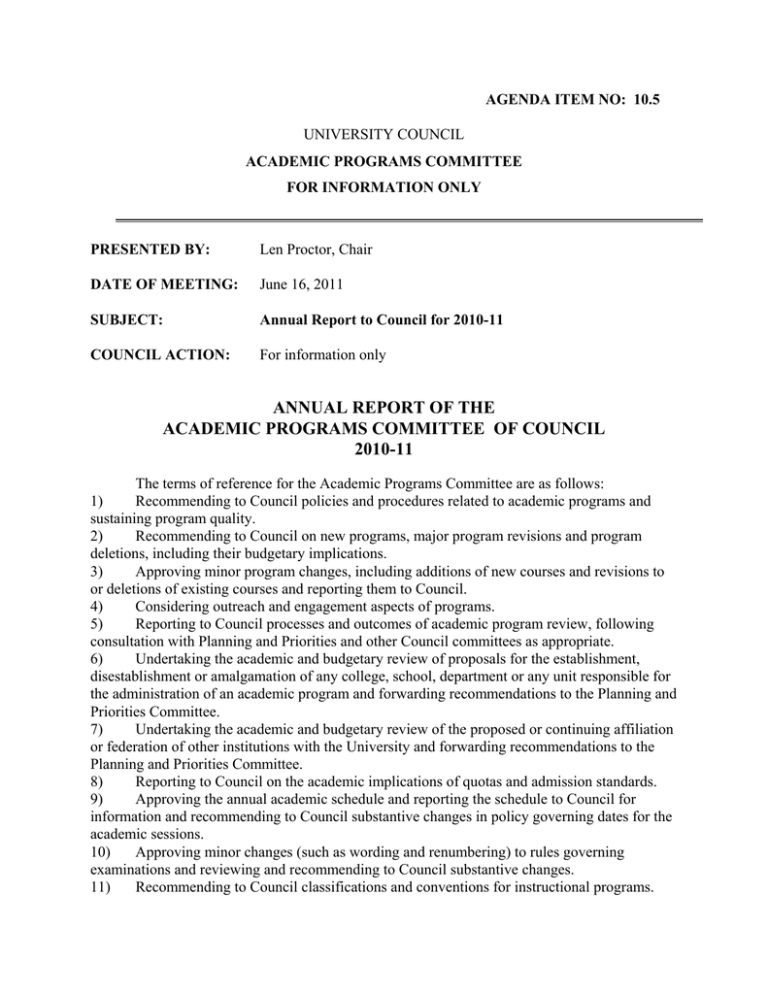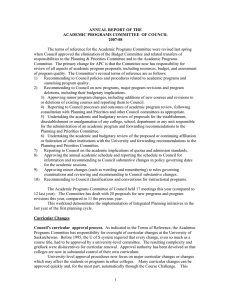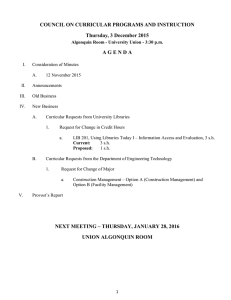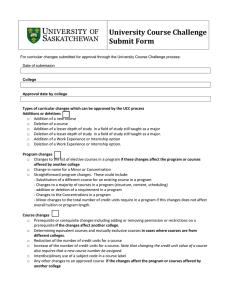AGENDA ITEM NO: 10.5 ACADEMIC PROGRAMS COMMITTEE FOR INFORMATION ONLY
advertisement

AGENDA ITEM NO: 10.5 UNIVERSITY COUNCIL ACADEMIC PROGRAMS COMMITTEE FOR INFORMATION ONLY PRESENTED BY: Len Proctor, Chair DATE OF MEETING: June 16, 2011 SUBJECT: Annual Report to Council for 2010-11 COUNCIL ACTION: For information only ANNUAL REPORT OF THE ACADEMIC PROGRAMS COMMITTEE OF COUNCIL 2010-11 The terms of reference for the Academic Programs Committee are as follows: 1) Recommending to Council policies and procedures related to academic programs and sustaining program quality. 2) Recommending to Council on new programs, major program revisions and program deletions, including their budgetary implications. 3) Approving minor program changes, including additions of new courses and revisions to or deletions of existing courses and reporting them to Council. 4) Considering outreach and engagement aspects of programs. 5) Reporting to Council processes and outcomes of academic program review, following consultation with Planning and Priorities and other Council committees as appropriate. 6) Undertaking the academic and budgetary review of proposals for the establishment, disestablishment or amalgamation of any college, school, department or any unit responsible for the administration of an academic program and forwarding recommendations to the Planning and Priorities Committee. 7) Undertaking the academic and budgetary review of the proposed or continuing affiliation or federation of other institutions with the University and forwarding recommendations to the Planning and Priorities Committee. 8) Reporting to Council on the academic implications of quotas and admission standards. 9) Approving the annual academic schedule and reporting the schedule to Council for information and recommending to Council substantive changes in policy governing dates for the academic sessions. 10) Approving minor changes (such as wording and renumbering) to rules governing examinations and reviewing and recommending to Council substantive changes. 11) Recommending to Council classifications and conventions for instructional programs. The Academic Programs Committee of Council held 13 meetings this year (compared to 17 last year.) The Committee has dealt with 26 proposals for new programs, program revisions and policy revisions this year (compared to 31 last year.) Curricular Changes Council’s curricular approval process. As indicated in the Terms of Reference, the Academic Programs Committee has responsibility for oversight of curricular changes at the University of Saskatchewan. Before 1995, the U of S system required that every change, even so much as a course title, had to be approved by a university-level committee. The resulting complexity and gridlock were disincentives for curricular renewal. Approval authority has been devolved so that colleges are now in substantial control of their own curriculum. University-level approval procedures now focus on major curricular changes or changes which may affect the students or programs in other colleges. Many curricular changes can be approved quickly and, for the most part, automatically through the Course Challenge. This allows the Academic Programs Committee to focus on the major curricular innovations and improvements which colleges propose. The Committee also deals with wider academic and curricular policy issues, and acts as a reference and approval body for various academic policies and policy exemptions for the Student and Enrolment Services Division. New programs, major program revisions, and program terminations. The Academic Programs Committee reviews major curricular innovations and improvements and makes recommendations to Council regarding approval. The Academic Programs Committee has also been delegated the authority to approve several types of program changes from colleges, including new Options and Minors in new fields of specialization. This improves Council’s ability to handle these types of program changes more quickly and efficiently, while still maintaining a university-level review of the changes to maintain quality and resolve any conflicts with other colleges. The following proposals and policies were dealt with by APC this year and forwarded to Council for decision or for information: October, 2010 For Decision – Medicine: Admissions criminal records check For Information - Change to withdraw deadline in the academic schedule November, 2010 For Decision - Procedures for approval of degree names For Decision – Engineering: Change of degree name to BE in Biological Engineering December, 2010 For Decision – CGSR: MA in Religion & Culture For Decision – Arts & Science: Termination of LUEST program For Decision – Arts & Science: Termination of Prairie Studies program For Information - Academic schedule for 2011-12; Arts & Science: Minor in Digital Culture & New Media; Arts & Science: Terminations of Co-Op Option in RUP program and of Minor in Philosophy, Science & Biotechnology 2 January, 2011 For Decision – CGSR: Post Graduate Diploma in Aboriginal Agriculture & Land Management For Information – Arts & Science: New Minor in Critical Perspectives on Social Justice and the Common Good. CGSR: Double-listing for PUBH/PUBP 861.3 Health, Post-Secondary Education and Social Programs: Funding, Structure and Reform March 2011 For Decision – CGSR: Change to Admission Requirements for Master of Nursing, Nurse Practitioner Option For Information – CGSR: Course-based Program Option in Philosophy Master of Arts program; Change of Field of Specialization name to MSc and PhD in Physics & Engineering Physics April, 2011 For Decision -- Medicine: Change to definition of Saskatchewan Resident For Decision -- Medicine: Increase to enrolment target For Decision -- WCVM: Change to admission requirements May 2011 For Decision – Arts & Science: Changes to BA requirements and termination of Advanced and Honours Certificates in Arts For Decision – Medicine: Global Health Certificate For Decision - Academic Courses Policy June 2011 For Decision – CCSR: Masters in Northern Governance and Development For Decision – CGSR: Dual Degree Proposals For Decision – University Nomenclature Report 2011 Notice of Motion – University of Saskatchewan Admissions Policy The committee also discussed a presentation from Bruce Sparling and Andrew Wallace regarding the potential for developing programs in Architecture at the U of S. The committee has developed a revised worksheet (attached) for internal use when reviewing program proposals. A workshop for departments and colleges will be held in September with the Planning & Priorities Committee to describe the Program Approval process. University Course Challenge. The University Course Challenge is a process mandated by University Council which allows for efficient but collegial review and approval of curricular revisions. University Course Challenge documents are posted on the UCC website at www.usask.ca/university_secretary/council/committees/academic_programs/course_challenge.p hp Since May 2010, a total of 13 Course Challenge documents have been posted (compared to 17 posted the previous year) These included new courses, prerequisite changes, course deletions 3 and program revisions for programs in Agriculture & Bioresources, Arts & Science, Education, Edwards School of Business, Engineering, Dentistry, Graduate Studies & Research, Law, Medicine, Nursing and Veterinary Medicine. The University Course Challenge is now posted on a regular schedule, so that items posted on approximately the 15th of each month are considered to be approved by the end of the month. No proposed curricular changes were challenged this year. Other curricular changes: Council has delegated authority for approval of many other curricular changes, such as course titles and descriptions, to colleges. In some cases, such as changes of course labels, this should be done in consultation with SESD. Changes of this type which affect the Calendar listings of other colleges can be posted for information in a course challenge posting. Council has delegated the authority to approve changes to non-university-level programs, such as certificates of successful completion and certificates of attendance, to the appropriate Dean and/or the Provost. This year, there were no new certificates approved The Approval Authority chart is located at www.usask.ca/university_secretary/council/committees/academic_programs/report_files/change s_chart.php Proposal forms, examples, and other information about approval procedures are available on the Committee’s website at www.usask.ca/university_secretary/council/committees/academic_programs/index.php Policies and Procedures There are a number of areas of Council policy and procedures which are reviewed on a regular basis by the Academic Programs Committee. These include issues around implementation of the enrolment plan, exam regulations, admission policies and procedures, and other areas of interest to students and faculty. This year, the Academic Programs Committee dealt with the following: Graduate Studies & Research A framework for departments and colleges to develop Memorandums of Understanding with other universities to offer dual degrees has been developed by the College of Graduate Studies & Research and is being presented to Council for approval. Student Enrolment and Services Division The following policies were presented to Council for approval, as shown above: Academic Courses Policy Nomenclature Report 2011 University Admissions Policy A University Transfer Policy is also being drafted as a framework for decisions on transfer and articulation issues. The committee has also reviewed and endorsed an Alberta and Northern recruitment initiative that will enable SESD to admit students from Alberta, Nunavut and Northwest Territories based on the average of either the relevant Grade 12 class grades, or their “blended” Grade 12 grades (which include their provincial exam results), whichever is to the students’ advantage. This will 4 bring the admission process for these students into line with the criteria now used for students from all other provinces, and will provide the U of S with a significant recruitment advantage in these regions. Academic schedule The Committee reviewed and approved the 2011-12 Academic Schedule. This was reported to the December, 2010 meeting of Council. Policy exemptions In specific situations and based on academic rationale, the Academic Programs Committee can permit colleges to implement curricular changes which are contrary to overall policies. This year, permission was given to the College of Graduate Studies & Research for double listing of PUBH/PUBP 861.3 Health, Post-Secondary Education and Social Programs: Funding, Structure and Reform Other discussions Pauline Melis, Assistant Provost - Institutional Planning and Assessment, provided a presentation on the university assessment process and the committee also held a discussion about the Canadian Council on Learning 2009 report “Up to Par: The Challenge of Demonstrating Quality in Canadian Post-Secondary Education.” Jim Greer provided information about the results of the University Learning Centre’s annual large class survey. Memberships The Academic Programs Committee sends representatives to several other committees. This year. the Centres Subcommittee representative was Peta Bonham-Smith and the Undergraduate Forum representative was Len Proctor. Members of the Academic Programs Committee Council Members Mik Bickis Mathematics & Statistics Peta Bonham-Smith Biology Jo-Anne Dillon Arts & Science Len Proctor (Chair) Curriculum Studies Xiao Qiu Food & Bioproduct Sciences Ludmilla Voitkovska English Jim Greer (Vice-Chair) University Learning Centre 2011 2011 2011 2011 2012 2013 2013 General Academic Assembly Members Angela Kalinowski History Dan Pennock Soil Science George Tannous Finance and Management Science Fang Xiang Wu Mechanical Engineering 2012 2012 2012 Sessional Lecturer Leslie Ehrlich 2011 Sociology Other members 5 2013 Undergraduate Student Kelsey Topola, VP Academic, USSU Graduate Student Cletus Asuquo/Sunisha Neupan, VP Academic, GSA Angela Ward [Provost designate] Acting Vice-Provost, Teaching & Learning Russ Isinger Registrar Marion Van Impe [VP Finance designate] Director, Student Accounts & Treasury Kyla Shea [Assistant Provost designate] Strategic Planning & Projects Officer Dale Amerud [Budget Director designate] Financial Analyst Secretary: Cathie Fornssler, Committee Coordinator, Office of the University Secretary I wish to thank Committee members for their willingness to undertake detailed and comprehensive reviews of program proposals. Their commitment to excellence and high standards resulted in improved programs for the University of Saskatchewan. In particular, I am grateful to Cathie Fornssler for the support she has given to the committee members and myself. Her dedication to organizing the activities of the committee, her wealth of background knowledge and her service to the academic community have been recognized this year in her receipt of the Presidents Service Award. Thanks again Cathie for all your help. I look forward to working with you and the members of the APC again during the next academic term. Respectfully submitted on behalf of the Committee, Len Proctor, Chair 6 Academic Programs Committee of Council COMMITTEE WORKSHEET for evaluation of program proposals Program: ____________________________________________________________________________ APC Discussion Leaders: ____________________________________________________________________ Program proposal document addresses/includes the following: Proposal Identification Type of Change Rationale and description of program o Addresses the criteria for evaluation of program proposals on the following pages o Includes Calendar Entry draft o Considers course sequencing and curriculum map Resources o Describes impact on resources used by existing programs o Addresses whether the program will be handled within existing resources o Addresses the source for any new required resources o Includes a memo from the Dean describing the commitment of resources o Includes a budget form if required Registrar Consultation Form Library Consultation Form Information Technology Consultation Form Physical Requirements Consultation Form 7 Criteria for Evaluation of Program Proposals at the University of Saskatchewan Based on procedural and policy documents as reported to or approved by Council from 1996 to 2010 This document is a guideline for the Academic Programs Committee of Council and for people who are designing new programs. It is expected that program developers would consider each of these factors as they develop new programs. The overall framework for program evaluation is as follows: Of primary importance to the University of Saskatchewan is that academic programs: • Be of high quality • Be in demand by current and perspective students • Use resources effectively In addition to the three primary characteristics related to quality, demand and resources, it is also important to consider the Strategic Directions and institutional imperatives of the University of Saskatchewan, namely: • The innovative features of a program • Commitment to inclusion of Aboriginal perspectives • The relevance of the program to our provincial context and global sense of place These requirements should take place within a context of fair and equitable access to our programs, to education equity and to environmental responsibility. The University is committed to developing programs which exhibit the three primary characteristics above, recognizing that our strengths lie with the programs which exhibit those characteristics. Programs should be assessed in terms of programming quality, demand and effective resource allocation; i.e., to determine how/why they meet the primary constraints. Innovative programming, including such approaches as inquiry-based and experiential learning, is responsive to the needs of students in a dynamic society, and engages them in service and research in a range of community contexts. The innovative features of a program and its relevance to our sense of place should be viewed as characteristics of additional importance, after the quality of, demand for, and costs associated with a program have been established. Certain core disciplines/programs represented within any university are not necessarily expected to be unique. However, it is still possible that instructional methods or particular sub-specializations might be described as innovative. On the other hand, being ‘innovative’, distinctive, or unique may be of greater importance where the cost of delivering the program is high or demand for the program is modest. The importance or relevance of a program to the province may relate to building on economic or other strengths which already exist. On the other hand, a program may serve as a nucleus contributing expertise and services which would otherwise be unavailable to the community. The table that follows identifies essential components for each of the primary characteristics and general criteria associated with them. The components are not necessarily independent and therefore similar criteria may appear for different components; e.g., both curriculum and learning environment have a criterion related to education equity. The relative importance of criteria for different types of programs can vary. 8 A Framework for Evaluation of Academic Programs Characteristics Proposal components which could demonstrate this characteristic: High Quality Student learning outcomes and goals at the program and course level have Curriculum been clearly identified and are measurable Curriculum is designed to meet the learning goals for the program (e.g. array and sequence of courses, modes of instruction and evaluation, development of skills, acquisition of knowledge, synthesis of information) Program includes opportunities for synthesis, application and integration of knowledge within and between disciplines Program is current, both in content and modes of instructional delivery, and reflects a responsiveness to changes in the discipline Curriculum reflects the goals of education equity Curriculum provides sufficient flexibility to individual students to choose courses according to their own interests within and outside their major discipline (i.e. electives) Program meets or exceeds accreditation and/or national standards if they exist OR qualifications/education of students graduating from specific ‘professional’ programs are acceptable to licensing bodies and/or employers There are opportunities for gaining Aboriginal perspectives or Aboriginal knowledge within the curriculum There are opportunities for internationalization within the curriculum Program provides students with the elements of a liberal education by encouraging the development of broadly informed, reflective and literal minds capable of independent and critical thinking The academic load does not impose undue barriers to completion such that students can complete the program in the regular allotted time Major areas of research, scholarly or artistic work are associated with opportunities for graduate education High Quality Program incorporates a variety of pedagogical processes (possibly Learning including instructional teams and partnerships), differentiates in response Environment to student need and, where possible, allows flexibility in scheduling and delivery beyond the main campus Teaching within the program demonstrates responsiveness to new developments in the field, including active learning, experiential learning and other learning activities.* Program integrates teaching and scholarship Approaches to instruction and students reflect a commitment to education equity Instructional methods and philosophies are consistent with program goals Scholarly work of faculty enhances the learning environment Necessary facilities, learning technologies and equipment are provided High Quality Students are involved in evaluating instruction and perceive instruction is Assessment effective Assessment of program effectiveness (i.e. students are satisfied that the program has helped them achieve their learning and/or career goals) is embedded within the program * (For more information, please see www.aacu.org/leap/documents/hip_tables.pdf) 9 Student or market demand The unit has discussed with SESD a plan to recruit students internally and externally Evidence has been gathered from employers or students to demonstrate demand for the program Interest by students of the Province is sufficient to establish or to maintain a program Market demand (provincial, national, international) for graduates justifies the size of the program which is offered by the University The program will attract outstanding students from within and outside the Province, while still providing general access to other applicants Uses resources The program proposal includes a budget which is a fair estimate of the effectively costs of the program (including course development), describes the marshalling of the financial resources to support the program and analyzes the financial impact of the program Program is delivered in a cost-effective manner, relative to similar programs Sufficient faculty and other learning support staff are available and qualified to offer the program If faculty and/or support staff are from another unit on campus, the other unit has agreed to support the program Conversations with other units indicate limited or no program duplication Alignment with Program is unique in content and/or approach – nationally, regionally, University and provincially College Program is innovative and reflective of our sense of place Priorities Program builds on and contributes to the cultural and economic strengths of Saskatchewan Program aligns with college/school priorities and imperatives Faculty and other personnel associated with the program provide services and expertise otherwise unavailable * (For more information, please see www.aacu.org/leap/documents/hip_tables.pdf) Comments from APC Discussion Leaders: 10


